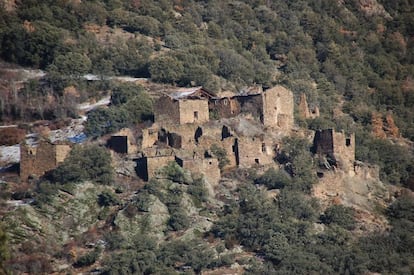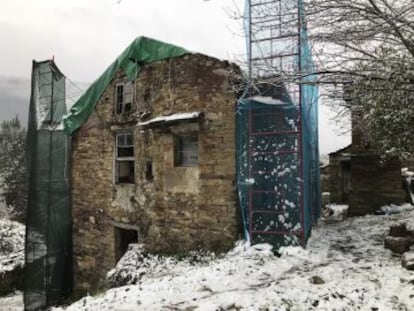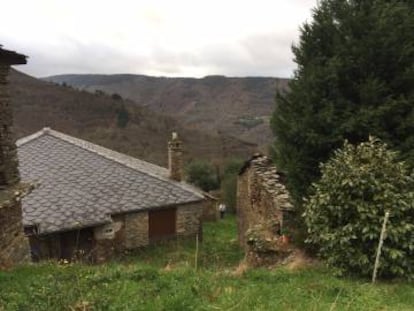Thinking of buying a deserted village in Spain? Hurry, prices are going up
Spaniards are now entering a market that has been traditionally dominated by Belgian, British and French buyers

The actress Gwyneth Paltrow recently recommended buying a deserted Galician village as a Christmas gift on her Goop lifestyle page, putting the message out there. A Dutch couple are now in the process of purchasing it and a real estate agency called Aldeas Abandonadas is drawing up the sales contract for less than €150,000. Located in the Galician province of Lugo, it comprises a 360m2 house, two haylofts, a granary and a number of other buildings scattered around the Eo Valley.
Far from the tarmac, exhaust fumes and skyscrapers peculiar to city life, there is an alternative lifestyle to be had in more than 3,000 deserted villages in Spain, above all in Galicia, Castilla y León, Aragón and Asturias. Though many can’t be sold due to the lack of basic paperwork, hundreds are on the market, seeking a second chance in the shape of a new owner to light their fires and provide the patter of feet through their streets.
There are a lot of clients who want to sell, people between the ages of 35 and 45 who are no longer attached to the family village
Elvira Fafian, Aldeas Abandonadas
And they are getting this second chance because finally, after years of languishing in forgotten enclaves, these ghost towns are back in demand. In fact, although 70% of clients come from abroad and tend to be British, Belgian and French, an increasing number of Spaniards are buying into the dream.
“While Spaniards accounted for less than 1% some years back, they now account for 30%,” says Elvira Fafian, founder of Aldeas Abandonadas.
One such buyer is Milagros Ruiz, who snapped up a village in Lugo called Pena Vella. Ruiz is a 45-year-old from Málaga who works in banking. She and her husband, 51, were drawn in by a TV show. They had gone to Galicia on holiday with the idea of buying a holiday home in the region. But then they asked themselves, why not just buy the village they had seen on TV? It was 15,000m2 and had six cottages. The whole thing cost just €60,000.

Once all the cottages are refurbished – there’s still one to go – Milagros and her husband will set up a rural tourism business, leaving the warm climes of Málaga behind them for a new life in leafy, green Galicia.
Thanks to grants from the regional government and the European Union, they received €200,000 to help turn the cottages into attractive rural accommodation. But most of these villages are in state of complete ruin and require an average investment of between €500,000 and €600,000.
Besides individual buyers wanting to set up a tourism business, a farm or simply live in the countryside, there are also businesses and big investors interested in these hamlets. Fifian says much of the interest here comes from Arabic and Russian investors, though individuals still account for 70% of the market and there are far more foreigners who are simply looking for a place to retire to.
Not long ago, Rosi Costoya, the founder of Galician Rustic, got a call from Canada. It was from a group of people who had been friends since childhood and who were looking for an alternative to the typical residential estates along the Mediterranean coast.

“They are lawyers and doctors and they want to set up a vegetable plot and a bar and be close to medical services,” says Costoya, whose Galician agency has more than 400 villages on its radar. “Six are sellable and we are going to sell two of them between January and February – the cheapest for €130,000,” she says.
Bullish market
The purchase of an abandoned village has shown itself to be more than just a short-term trend. And that is why there are an increasing number of owners who had previously forgotten their inheritance but who are now sorting out the papers in order to put their abandoned homes or hamlets on the market. “We are getting about 20 a month,” says Fafian. “There are a lot of clients who want to sell, people between the ages of 35 and 45 who are no longer attached to the family village.”
They are also taking advantage of the fact that the prices are rising – between 5% and 10% in some cases. “Several years ago, the cheapest village was €12,000 but now the cheapest is €52,000,” says Fafian. Even so, it is still a lot less than a city apartment.
Most of these villages are in state of complete ruin and require an average investment of between €500,000 and €600,000
Aldeas Abandonadas has 110 villages on its books ready to sell. The average price lies somewhere between €200,000 and €450,000, although there are those going for between €2.5 and €7 million – the latter a village in Huelva.
The sale of these hamlets is not easy, however. Rosi Costoya has spent a year trying to gather all the paperwork needed for the sale of a village in Viveiro. And she is currently in talks with the 24 owners of another village. “It is usually impossible to reach an agreement if there are more than 10 owners,” she says.
Both Aldeas Abandonadas and Galician Rustic have the job of dealing with those who have inherited property in these villages. First they have to locate them – some are dead and others have moved abroad – and then get them to reach an agreement. Their job also involves visiting the public notary, the land register and the local councils in search of necessary paperwork. In short, the most difficult part of the entire transaction is making the village sellable in the first place. “As far as the land register is concerned, the hamlet has no borders,” says Fernando Acedo-Rico, director of the Registrar Association’s Institutional Relations department. “Our records show different properties that the seller needs to identify and locate within the village.”
This is where Aldeas Abandonadas and Galician Rustic come in, taking the exact measurements and recording the hamlet on the Property Register so the new buyers do not have to worry that, a few years down the line, an heir will turn up and lay claim to a wall or a pile of rubble that has been refashioned into an outhouse. “It’s a good idea to register it to show who the new owner is,” says Acedo-Rico.
The agencies get a good deal of support from the local councils who are keen to see these villages injected with new life and help by providing the basic infrastructure. “That’s why we usually ask the buyer to refurbish and start a business, as opposed to buying the village and just leaving it,” says Fafian.
English version by Heather Galloway.
Tu suscripción se está usando en otro dispositivo
¿Quieres añadir otro usuario a tu suscripción?
Si continúas leyendo en este dispositivo, no se podrá leer en el otro.
FlechaTu suscripción se está usando en otro dispositivo y solo puedes acceder a EL PAÍS desde un dispositivo a la vez.
Si quieres compartir tu cuenta, cambia tu suscripción a la modalidad Premium, así podrás añadir otro usuario. Cada uno accederá con su propia cuenta de email, lo que os permitirá personalizar vuestra experiencia en EL PAÍS.
¿Tienes una suscripción de empresa? Accede aquí para contratar más cuentas.
En el caso de no saber quién está usando tu cuenta, te recomendamos cambiar tu contraseña aquí.
Si decides continuar compartiendo tu cuenta, este mensaje se mostrará en tu dispositivo y en el de la otra persona que está usando tu cuenta de forma indefinida, afectando a tu experiencia de lectura. Puedes consultar aquí los términos y condiciones de la suscripción digital.









































